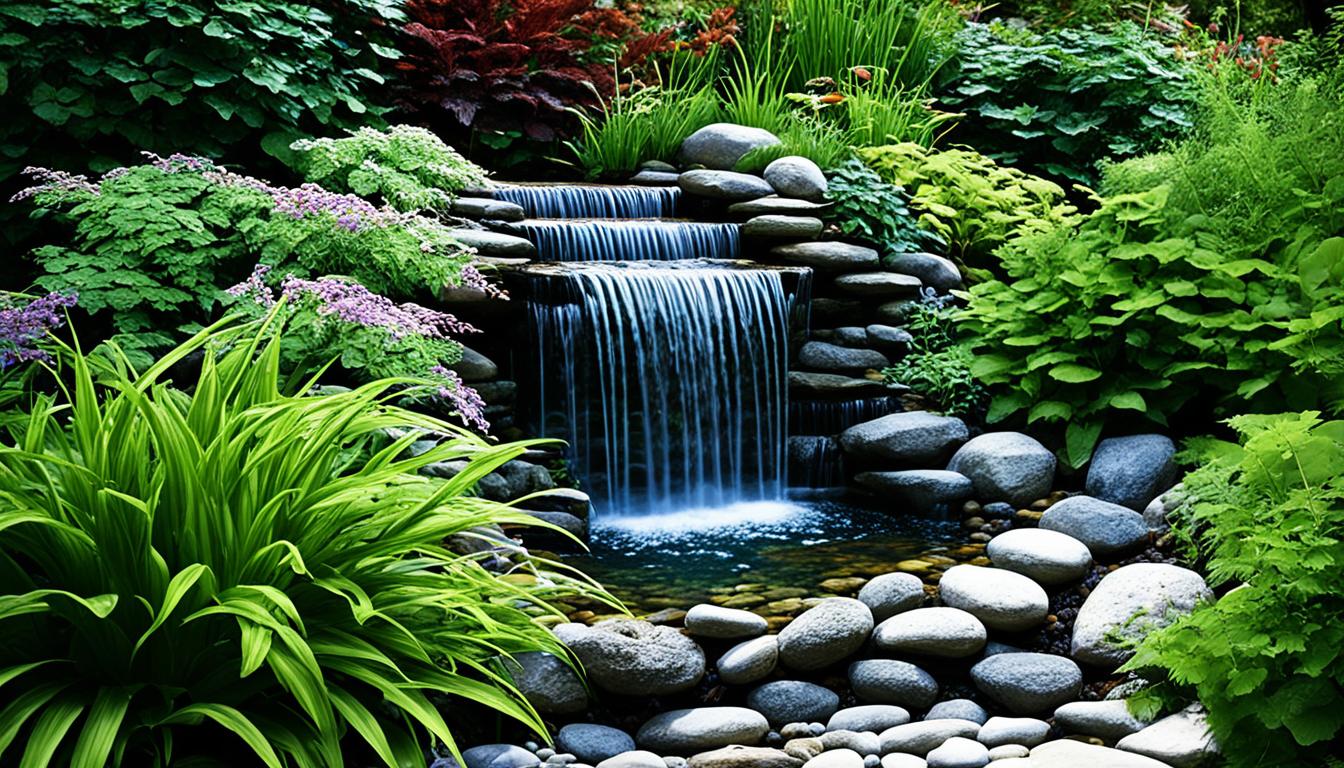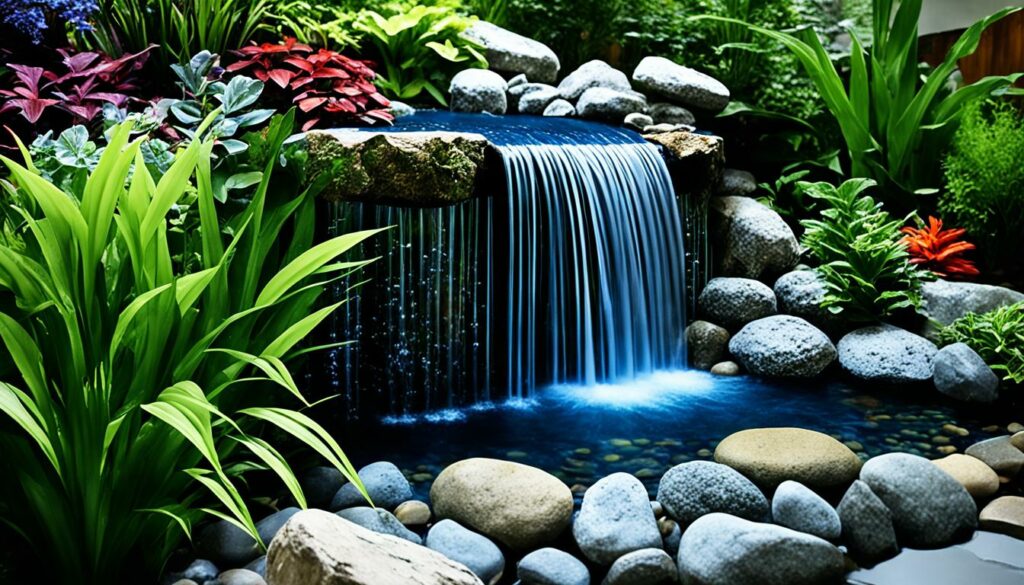
Garden waterfall filtration systems are crucial in maintaining a healthy pond ecosystem. Often placed at the top of the waterfall, these systems, also known as waterfall filters or bio-filters, ensure water clarity and quality by managing substantial flow rates and various media types. Additionally, they are typically cost-effective and require low maintenance, making them an ideal solution for garden enthusiasts.
The best waterfall filters can be seamlessly integrated into your landscape, preserving the aesthetic appeal while efficiently filtering the water. With optimal waterfall filtration systems, your garden pond can enjoy clear and healthy water year-round.
Introduction to Garden Waterfall Filtration Systems
Garden waterfall filtration systems are integral for any aquatic garden, playing a pivotal role in the continuous cleansing and circulation of pond water. Understanding the pond filtration essentials can make a significant difference in maintaining an inviting and serene environment.
- Mechanical filtration: These filters primarily focus on removing physical debris from the water. By clearing out leaves, twigs, and other particles, they help in maintaining the clarity of the water.
- Biological filtration: This method employs beneficial bacteria to break down harmful chemicals and toxins. This process is crucial for sustaining aquatic garden health and promoting a balanced ecosystem.
- Chemical filtration: Though not always necessary, chemical filters can be used to neutralize specific contaminants in the water, offering an added layer of protection.
The importance of clean water extends beyond visual enjoyment. Pristine water is vital for the health and survival of plants and fauna within landscape waterfalls. Regular maintenance and choosing the right filtration system can ensure the longevity of your aquatic garden's beauty and vitality.
Healthy water equals a thriving aquatic ecosystem. Investing in the right filtration system is not just a recommendation, but a necessity for every aquatic gardener.
Types of Waterfall Filtration Systems
Integrating efficient filtration systems in your garden waterfall is crucial for maintaining a clean and vibrant water feature. Here, we delve into three primary types of waterfall filtration systems: biological filters, pressurized filters, and mechanical filters.
Biological Filters
Biological filters play a vital role in waterfall biological filtration. They utilize beneficial pond bacteria to convert harmful ammonia, originating from organic waste, into safer nitrates that serve as nutrients for aquatic plants. These filters often form part of the waterfall's foundation, enhancing landscaping aesthetics while ensuring effective ammonia filtration.
Pressurized Filters
Pressurized filters are another popular choice, especially among professional pond keepers and koi enthusiasts. These high-efficiency pressurized waterfall filters come with an integrated back-flush cycle for easy cleaning and advanced media that generally require no replacement. Working alongside advanced water garden filters, they provide superior filtration but may necessitate larger pumps due to added head pressure.

Mechanical Filters
Mechanical filters, such as pond skimmers, are essential for removing floating debris from the water surface. These filters focus on mechanical debris removal and are designed to sieve out leaves, sticks, and other floating materials before they decay and release harmful substances. Effective waterfall mechanical filtration systems reduce the potential workload for biological and chemical filters, thereby maintaining a healthier pond environment.
Reading more about custom water features will help enhance the overall experience of incorporating these filtration systems in your garden, creating a serene atmosphere. Check out this comprehensive guide on custom water features to explore further.
Choosing the Right Waterfall Filtration System
When selecting a waterfall filtration system, several factors must be considered to ensure optimal performance and longevity. It's essential to match the system with the specific requirements of your pond and waterfall.
Consider Pond Size
Matching pond size with filters is crucial for maintaining the water quality. Different filters are designed for various pond capacities, which emphasize the importance of pond capacity considerations in the selection process. When considering a filtration system, ensure the waterfall filter capacity aligns with the water volume of your feature. For an in-depth guide on custom water features and their maintenance, check out this article.
Flow Rate Requirements
The flow rate is a critical factor in waterfall filtration. To ensure optimal flow rates for waterfall filtration, the necessary gallons per hour (GPH) must be calculated based on the waterfall's dimensions. A common guideline is to have a minimum flow rate of 100 GPH per inch of waterfall spillway width. This consideration helps in the proper filter pump pairing, ensuring the filtration system can handle the needed flow rate to maintain clear water and a healthy ecosystem.
Maintenance Needs
Understanding the maintenance requirements of your waterfall filtration system is vital. Waterfall filtration system maintenance can range from frequent, hands-on involvement to low-maintenance bio-filters that require minimal user intervention. Choosing user-friendly filtration options that align with your maintenance capabilities will influence the overall experience. Regular maintenance ensures the optimal performance and longevity of the system, making your aquatic feature both beautiful and manageable.

Incorporating a well-chosen filtration system tailored to your pond's size, flow requirements, and desired maintenance level is vital for creating a visually appealing and sustainable water feature. For more tips on integrating custom water features into your landscape design, you can explore a comprehensive guide here.
Top-Rated Waterfall Filtration Systems
The market offers a multitude of filtration systems that cater to different needs and preferences. Top-rated waterfall filtration systems often combine biological, mechanical, and chemical filtration methods. Equipped with advanced features like UV clarification, these systems ensure the cleanliness and clarity of your garden waterfall.
Among the best-rated garden waterfall filters, pressurized filters with built-in backwash capabilities stand out for their ease of maintenance. These systems efficiently manage biological filtration while also sieving out solid waste. Another excellent option includes mechanical filters known for their effectiveness in removing debris and promoting water clarity.
For those seeking top-quality waterfall systems, look for products that integrate multiple filtration methods, providing comprehensive solutions to maintain the water quality. Market-leading filters are designed to meet high standards of performance and reliability, ensuring that your garden waterfall remains a striking feature.
- Pressurized filters with built-in backwash
- Mechanical filters for solid waste removal
- Biological filters that enhance natural purification
Choosing market-leading filters ensures durability and efficiency, helping to maintain a pristine and healthy aquatic environment in your garden waterfall.
Conclusion
In summary, investing in the right garden waterfall filtration system is crucial for maintaining garden waterfall clarity and ensuring a healthy pond ecosystem. The effectiveness of your filtration system directly affects not just the cleanliness of the water but also the overall health of the aquatic life and visual appeal of your garden.
When choosing a filtration system, it's important to consider factors such as pond size, flow rate requirements, and maintenance needs. Each type of filter—biological, pressurized, and mechanical—offers unique benefits, and the selection should align with your specific situation and preferences. An informed decision in this regard can make a significant difference in the longevity and performance of your garden waterfall.
In conclusion, a well-chosen filtration system will provide a clean, thriving aquatic environment and a stunning visual display that will enhance your garden's beauty for years to come. By focusing on these key considerations, you can ensure that your pond remains clear and healthy, providing a delightful centerpiece in your outdoor space.








